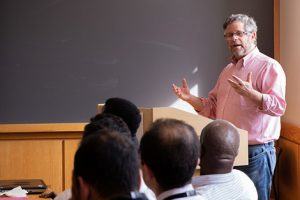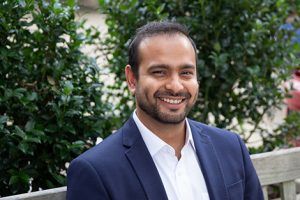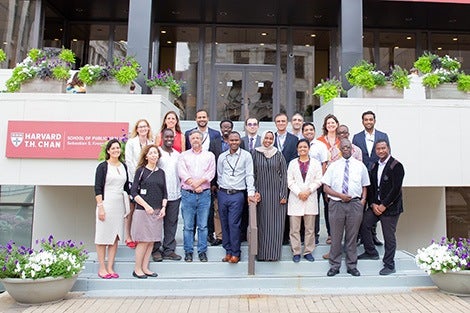August 22, 2018—Seven new primary health care centers in Africa may soon carry the name of Bernard Lown, a renowned cardiologist and professor emeritus at Harvard T.H. Chan School of Public Health. The project is the latest evolution of the Bernard Lown Scholars in Cardiovascular Health, a training program at the School for mid-career public health scientists and professionals from low- and middle-income countries. Currently, several of the scholars are working with the program to establish primary health care centers as Lown Community Health Centers (LCHCs) in areas where access to care is limited, and to expand the services at existing centers in India and Pakistan through partnerships. The LCHCs will serve as a laboratories for research to design, develop, and test low-cost and scalable solutions for preventing disease and improving health and wellbeing in underserved populations.
The program hosted 12 scholars at the School for four weeks, beginning in July, from Africa, the Middle East, South America, and South Asia. The program included a course led by Harvard Chan School faculty on global cardiovascular disease prevention and weekly seminars on topics such as nutrition and research methods; a visit to a neighborhood health station in Central Falls, Rhode Island, where the group learned how it operated and how staff handled challenges such as budget shortfalls; and a talk from program and Harvard Chan alumnus Adolfo Rubinstein, SM ’96, a cardiovascular epidemiologist and the current minister of health in Argentina. Rubinstein shared his efforts to improve chronic disease prevention and control in his country, including a plan to require front-of-package nutrition labeling to fight childhood obesity.

During the program, scholars worked with faculty mentors to develop plans to establish and run LCHCs or research proposals for cardiovascular disease prevention projects—such as working with women’s self-help groups in the slums of Kerala, India, to promote tobacco cessation, or using digital literacy workshops as a way to promote healthy lifestyle behaviors for seniors in Brazil—which they presented to their cohort.
A doctor’s responsibility
Each scholar also met with Lown in his residence. For Mohsin Ali Mustafa, a physician from Pakistan, the experience of speaking with the 97-year-old, who received a Nobel Peace Prize as a co-founder of International Physicians for the Prevention of Nuclear War, left a profound impression.
They discussed the idea that doctors must take a larger role in society beyond simply handing out medicine, Mustafa said. “He strongly emphasized that if you identify a problem somewhere, it is your responsibility to fix it.”

Mustafa is developing a plan to turn the clinic he established in Karachi, Pakistan, into a LCHC. His clinic currently partners with nearby schools, which pay the equivalent of one dollar per child per month in exchange for in-school first aid, health education, and free medical care at the clinic for students and their parents. This fall, he’ll be scaling up services from two schools to eight.
Taking a step back from his work to participate in the Lown Scholars program has been “a breath of fresh air,” he said. “When you are in the trenches back home, you don’t have time to think about what you have done, where the gaps are, and how to fix them.”
At the end of the program, scholars have the opportunity to submit their proposals for seed funding. Those who are funded may be invited to return next year to talk about the progress of their projects and mentor the next year’s cohort. All receive ongoing mentorship from Harvard faculty and access to the growing worldwide network of Lown Scholars.
Vilma Irazola, a researcher from Argentina, returned this year to report on her project—an assessment of the ways that the built environment affects the diet and physical activity of adults in four communities in Argentina, Chile, and Uruguay. Irazola, a senior researcher at the Institute for Clinical Effectiveness and Health Policy in Buenos Aires and the co-director of the South American Centre of Excellence for Cardiovascular Health, has been working with Harvard Chan School Professor of Demography Marcia Castro.
“Everyone on my team—and the teams we work with—is benefiting from Marcia’s mentorship and expertise,” Irazola said. “The Lown Scholars program has a multiplying effect.”
Photos: Nilagia McCoy
